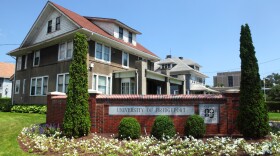From the start, news of a possible merger between Marlboro College and the University of Bridgeport stirred mixed feelings on campus and in town. Some worried the tiny liberal arts college would lose its identity; others said it was a reasonable solution to a challenging financial situation.
But now that the merger is off everyone is wondering what's next.
Allison Turner works in one of the biology labs at the college. As she headed into the Marlboro post office Monday morning, Turner said she had been cautiously optimistic about the possible merger announced earlier this summer.
"It sounded kind of hazardous," Turner said, "but I was willing to go with it if it was all we had. You know, at least look at it, which is what we did."
But that possible merger is now off the table.
The president of University of Bridgeport, in Connecticut, issued a statement saying that the challenges at Marlboro were too great for the larger school to proceed. Meanwhile, Marlboro College President Kevin Quigley said the Vermont school pulled out to protect the integrity of its academic model.
And so, Turner said, a lot of people at the school are wondering what's next.
"In a way it's exciting because it opens up a lot more opportunities," Turner said. "But the big question is: 'What are those opportunities going to be? Where can we go?' We didn't see many opportunities before. So that's the thing to be asking people is: 'What are the possibilities for the future?' And I don't know what those are."
More from VPR — Marlboro College, University Of Bridgeport Call Off Merger Talks [Sept. 16]
Marlboro College is tucked away up on a hill; you could cruise through town and not even know there's a school here. There aren't any stores in town, so students aren't really contributing to the town's economy. But still, the college is a big part of the town's identity, and resident Allen McLane said a lot of people in town are paying attention.
"There are a lot of people like me who came to be students and stayed," said McLane, who came here in the mid-1970s. "Other people come here to be teachers, instructors ... or become residents and their children go. So I mean, it's quite [an] integral part of the town in some respects."
Marlboro College built its reputation on being a place for independent thought and self-directed study.
Geoffry Brown, a retired Marlboro professor, said a group of former faculty recently met and was largely opposed to the merger. He said the kind of education that Marlboro provides is more important today than ever before.
"The main thing that a liberal arts education has to teach, as Marlboro has stated for a long time, is to teach someone how to think and to develop the mind, the capacity, to address any issue," Brown said. "And that can lead to success in whatever field you want."
Marlboro College started on a small farmin 1946. At one time there were about 300 students there, but enrollment this semester is fewer than 150.
Paul Butler's family goes back three generations in town, and his grandfather was friends with the founder of the college. Butler said the proposed deal would have at least allowed Marlboro to keep its doors open, even if it forced some administrative or academic changes.
"With the enrollment where it is, the college's continued ability to operate is really compromised," Butler said. "So I don't know any details of the proposed merger, but it seemed like it was a credible effort to maintain the college and the campus and continue operating."
In an interview Monday with VPR, Quigley said there are other colleges that might be interested in pursuing merger talks. Quigley told VPR that if the school has to close, then it will happen in an "ethical fashion as humanly possible."
Copyright 2019 Vermont Public Radio



